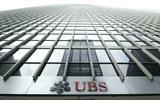UBS AG, Switzerland’s largest bank, said yesterday it expects a first-quarter loss of nearly 2 billion Swiss francs (US$1.75 billion) and will cut 8,700 jobs worldwide by the end of next year.
It also said clients have continued to withdraw their money from the bank in the wake of its decision to cooperate more closely with foreign authorities over tax evasion.
The firm, which has been hard-hit by subprime-related losses, said it would “adapt its size to the changed market conditions and lower levels of business.”

PHOTO: AFP
“UBS is planning cost savings by the end of 2010 of approximately 3.5 to 4 billion francs compared to 2008 levels,” the bank said in releasing details on its situation in advance of the annual shareholders meeting.
In prepared remarks for the meeting, new CEO Oswald Gruebel said the bank knows where it has to set to work.
“It will be a long road back to success without any quick fixes,” Gruebel said. “Rather, we will move forward step by step in a rigorous and disciplined manner.”
The bank, which already has suffered billions of dollars of losses over the past two years and received a bailout from the Swiss government, said it “estimates that it will report a loss attributable to shareholders of almost 2 billion francs in first quarter 2009.”
It said the shortfall is due mostly to losses of about SF3.9 billion on previously disclosed bad investments, credit loss expenses and adjustment in values of toxic assets.
UBS said its wealth management and Swiss bank division recorded an outflow of net new money totaling SF23 billion. That occurred mainly after the announcement of a settlement with US authorities over their investigation into UBS’ alleged assistance to wealthy Americans seeking to avoid paying US taxes.
At the same time, it said its wealth management Americas unit recorded net new money of around SF16 billion.
The bank said it still expects to have a tier 1 capital ration of about 10 percent at the end of the first quarter.
The bank said the job cuts would be unavoidable because it needs to have cost savings in all areas.
“UBS expects to reduce the number of its employees to about 67,500 in 2010,” a statement said. “At the end of March 2009 UBS employed 76,200 people in over 50 countries.”
The bank said it would continue to reduce risks and was conducting a review to decide which high-risk and unpromising businesses it would exit.
Full first-quarter results and other details about the banks plans will be released on May 5, it said.

Nvidia Corp yesterday unveiled its new high-speed interconnect technology, NVLink Fusion, with Taiwanese application-specific IC (ASIC) designers Alchip Technologies Ltd (世芯) and MediaTek Inc (聯發科) among the first to adopt the technology to help build semi-custom artificial intelligence (AI) infrastructure for hyperscalers. Nvidia has opened its technology to outside users, as hyperscalers and cloud service providers are building their own cost-effective AI chips, or accelerators, used in AI servers by leveraging ASIC firms’ designing capabilities to reduce their dependence on Nvidia. Previously, NVLink technology was only available for Nvidia’s own AI platform. “NVLink Fusion opens Nvidia’s AI platform and rich ecosystem for

WARNING: From Jan. 1 last year to the end of last month, 89 Taiwanese have gone missing or been detained in China, the MAC said, urging people to carefully consider travel to China Lax enforcement had made virtually moot regulations banning civil servants from making unauthorized visits to China, the Control Yuan said yesterday. Several agencies allowed personnel to travel to China after they submitted explanations for the trip written using artificial intelligence or provided no reason at all, the Control Yuan said in a statement, following an investigation headed by Control Yuan member Lin Wen-cheng (林文程). The probe identified 318 civil servants who traveled to China without permission in the past 10 years, but the true number could be close to 1,000, the Control Yuan said. The public employees investigated were not engaged in national

CAUSE AND EFFECT: China’s policies prompted the US to increase its presence in the Indo-Pacific, and Beijing should consider if this outcome is in its best interests, Lai said China has been escalating its military and political pressure on Taiwan for many years, but should reflect on this strategy and think about what is really in its best interest, President William Lai (賴清德) said. Lai made the remark in a YouTube interview with Mindi World News that was broadcast on Saturday, ahead of the first anniversary of his presidential inauguration tomorrow. The US has clearly stated that China is its biggest challenge and threat, with US President Donald Trump and US Secretary of Defense Pete Hegseth repeatedly saying that the US should increase its forces in the Indo-Pacific region

ALL TOGETHER: Only by including Taiwan can the WHA fully exemplify its commitment to ‘One World for Health,’ the representative offices of eight nations in Taiwan said The representative offices in Taiwan of eight nations yesterday issued a joint statement reiterating their support for Taiwan’s meaningful engagement with the WHO and for Taipei’s participation as an observer at the World Health Assembly (WHA). The joint statement came as Taiwan has not received an invitation to this year’s WHA, which started yesterday and runs until Tuesday next week. This year’s meeting of the decisionmaking body of the WHO in Geneva, Switzerland, would be the ninth consecutive year Taiwan has been excluded. The eight offices, which reaffirmed their support for Taiwan, are the British Office Taipei, the Australian Office Taipei, the